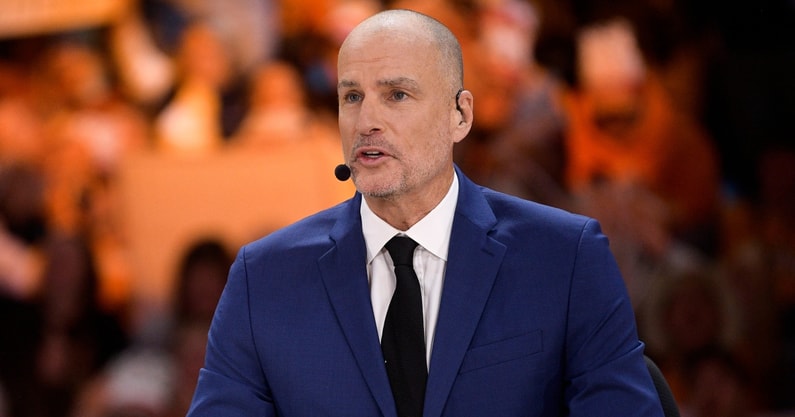Jay Bilas claps back, doubles down on court storming stance, solution

Court storming is one of the traditional ways to celebrate an upset in college basketball. However, after multiple incidents where fans crashed into players, there have been calls for change. The most notable voice calling for change has, in turn, become Jay Bilas.
Bilas, a college basketball analyst for ESPN, has received pushback for his strong stance against court storming. However, in an appearance on The Dan Patrick Show, Bilas clapped back and doubled down on both his court storming stance and his solution.
“No, because it’s another thing where nuance gets lost,” Jay Bilas said. “Like, the whole discussion was the NCAA or the institutions or the conferences, they’re not gonna do anything about this anyway. They say they can’t. Experts tell them they can’t stop it because it would cause more problems.”
There have been a couple of notable court storming incidents this season. The first came when an Ohio State fan ran into Iowa star Caitlin Clark, shaking her up. The second came when Wake Forest fans crashed into Kyle Filipowski of Duke, injuring him.
“They could stop it tomorrow if they wanted, and obviously detaining people and giving them citations like you would on the side of the road, giving somebody a ticket, is more to the extreme side. I mean, they could hire way more security, but that’s gonna cost them way more money. You could stop it tomorrow if you wanted to. They don’t want to and that’s okay, and I’m not trying to talk anybody out of loving it. I mean, there have been times in my career where I thought it was fine,” Bilas said.
“But then you see when I was at NC State and they had a court storming and there were people that got hurt, and you’re just asking yourself, ‘Is it worth it?'”
Jay Bilas went back to his example about Kansas, where he sees a passionate fanbase that shows its support without storming the court.
Top 10
- 1New
Michigan football
Ex-coaches get show-causes
- 2Hot
Shedeur Sanders
On CFL negotiation list
- 3
Greg McElroy
Polarizing Top 10 QB ranking
- 4Trending
CFB Top 25
Post-spring rankings
- 5
Shaquille O'Neal
Takes CBB GM job
Get the On3 Top 10 to your inbox every morning
By clicking "Subscribe to Newsletter", I agree to On3's Privacy Notice, Terms, and use of my personal information described therein.
“And, for some people, like fans, seem to think they’re entitled to it but I raised a point on a show called Pardon My Take about Kansas. They were talking about passion if I remember right. It shows the passion of the fans, the court storming and, like, it’s after the game’s over. It’s great. It’s a great celebration, but the passion is shown in my view during the game, and there’s no better place than Kansas and they don’t have any court stormings. I think the response was, ‘They don’t storm the court because they win all the time.’ I mean, that’s not the point I was making but sometimes nuance gets lost. That’s okay. That’s what we do.”
At that point, Dan Patrick argued for better security around visiting teams, even a police presence around them. He also said that the students should be the responsibility of the university in this situation.
On top of that, Jay Bilas also argued that part of why court storming is so common comes down to how the media handles it.
“I agree with all of that but just when you start talking about, now we have to have a police presence to protect the players because we’re accepting that this is gonna happen, and we have rules in place at these conferences that it shouldn’t happen. So, it’s prohibited but there’s a nod and a wink that we’re going to allow it and just protect the players,” Bilas said.
“And look, I get all of it, everybody wants to show that they’re passionate. Part of this is for recruiting, part of it’s for marketing, and look, I’m not saying that we’re evil because we show it, but we can’t sit here and rail this is wrong, this is wrong, when we do it, when we’re part of it that way. It doesn’t mean that it’s this horrible thing that everybody needs to be called on the carpet. But we need to acknowledge that we glorify it or certainly use it to our benefit.”